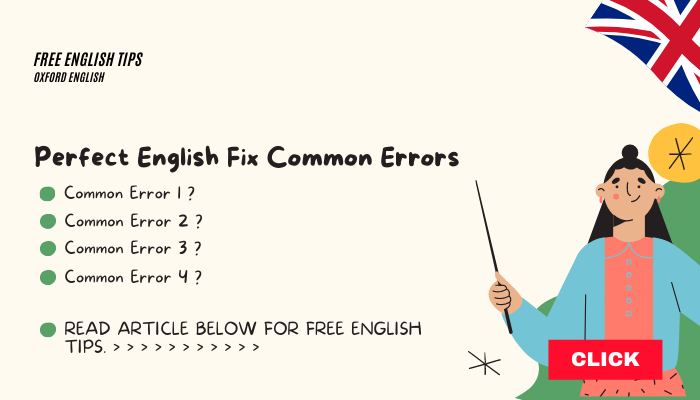Great site to keep my english skills updated for work and travel. I am really enjoying the lessons!
Maria C
 Argentina
Argentina


Los errores nos obligan a explorar alternativas. Requieren que volvamos a examinar un problema y pensemos creativamente para encontrar o desarrollar otras soluciones o enfoques. Los errores nos enseñan lo que no funciona y nos anima a crear nuevas formas de pensar y hacer.
1. It Is Very Important Practice English.
La oración correcta es: It is very important to practice English.
En esta estructura, cuando un verbo se usa después de un adjetivo, el verbo está en to-infinitive:
2. I Want To Take Part Of The Event.
La oración correcta es: I want to take part in the event.
La expresión “take part in” es una forma informal de decir “participate in”.
La expresión “part of” significa una parte de, o algo de:
3. These Are My Favorites Shoes.
La oración correcta es: These are my favorite shoes.
Los adjetivos siempre son singulares en inglés, ¡incluso si el sustantivo es plural!
4.1. She Takes Always A Long Time To Finish.
La oración correcta es: She always takes a long time to finish.
La palabra “always” viene antes del verbo principal, que en esta oración es “takes”. Aquí hay más ejemplos:
4.2. He Always Is Late.
La oración correcta es: He is always late / He’s always late.
La única excepción a la regla es cuando el verbo es una forma de “to be”; en este caso, “always” viene después de “to be”:
En el futuro, la palabra “always” viene en el medio: “will always be”:
5. I Couldn’t Attend To The Class Yesterday.
La oración correcta es: I couldn’t attend the class yeterday.
Cuando estés presente en un lugar, usa el verbo atender sin “to”:
La expresión “attend to” significa algo diferente: significa ocuparse de algún negocio o encargarse de algo:
6. We Arrived To The Airport At 3:00.
La oración correcta es: We arrived at the airport at 3:00.
Usamos "go to" y "get to", pero "arrive at" un lugar y "arrive in" una ciudad/país:
Nota: la palabra "home" no lleva preposiciones:
7. The Accident Caused A Lot Of Damages To The Car.
La oración correcta es: The accident caused a lot of damage to the car.
"Damage" se considera un sustantivo incontable y siempre es singular. La palabra "damage" significa daño o problemas a un objeto o propiedad.
El sustantivo "damages" significa algo diferente: esta palabra se refiere al dinero otorgado por el tribunal para compensar el daño. Por ejemplo:
If a faulty microwave explodes and causes damage to your house, the manufacturer of the microwave might have to pay damages to you so that you can repair your house.
8. My Apartment Is Ten Miles Far From Here.
La oración correcta es: My apartment is ten miles away from here.
También puedes decir: My apartment is ten miles from here. (sin usar "away").
Esto es confuso porque la pregunta podría ser “How far…?” – pero no usamos la palabra “far” cuando damos una respuesta con la distancia específica:
“It’s about two blocks away.“
“At least five miles – you should probably take the bus.”
Solo puede usar “far” en la respuesta cuando dice “It’s not far.” (lo que significa que está a poca distancia) o “It’s pretty/quite/very far.” (lo que significa que está a una gran distancia)
9. The Boss Requested Me To Send The Information.
Las oraciones correctas son:
Después de la palabra "ask", SIEMPRE usamos una persona:
La palabra "request" es una palabra más formal. No usamos una persona inmediatamente después de “request.”
Observe las dos estructuras diferentes de arriba:
= request + noun
= request + that + person + verb
10. On Next Friday We’re Going To Paris.
La oración correcta es: Next Friday we’re going to Paris.
Al usar "next", "last" y "this", no necesita usar una preposición:
Verifique su puntaje: pruebe nuestro cuestionario de inglés gratuito + obtenga un bono gratis